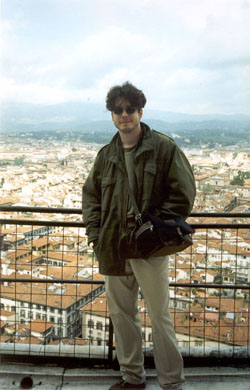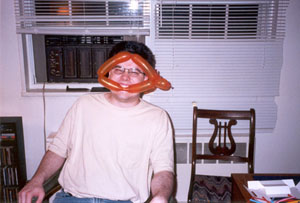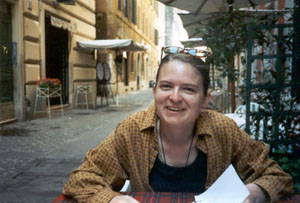Aggiornato il giorno 9 Febbraio 2021
After the first ten minute of playing, Anchorhead recalls Infocom’s Wishbringer: for the atmosphere, the places, the feeling. Then everything passes and the immeasurable difference jumps out: Anchorhead does not want to be a joke, it wants to play serious. No spells to cast, no shops to buy a magical broom to take the flight. You’re under the rain in an unkown city, your husband had the brilliant idea to leave you alone because he wanted to go in a library. You look forward to getting under the covers. But it is not therefore easy because the city is, exactly, unknown.
And perhaps also your husband is also.
Anchorhead does not anticipate to you anything: you will discover all road making. You’ll be involved to the point that, when you’ll leave your place to go out, when you’ll enter a library, when you’ll go in a bar to take a coffee… well, when you’ll make all these things, you’ll think that the city in which you live is not so bad.
And you’ll think that only a computer can take you to Anchorhead another time.
And you’ll think that only a computer, now, can let you read an interview with the person who has invented all this.
So, who is Mike Gentry?
I’m 28 years old, and I do web maintenance and copyediting for a monthly scientific journal. When I wrote Anchorhead I was living in Austin, Texas, but now I live in the suburbs of Washington, D.C. with my wife, Ramee, and my two cats.
How much time did you need to think and realize Anchorhead?
Anchorhead took me about a year to write. I spent a few weeks sketching maps and hammering out the story, and the rest was all coding. At least 6 solid hours of coding per day, every day. I didn’t own a computer at the time, so most of it was done at work. The first release was terrible, full of bugs, and it took me another 3 months to go through all the bug reports and fix all the problems.
Did someone help you?
No. I got lots of very helpful advice from the folks at rec.arts.int-fiction, and of course my beta-testers did a great job, but I created the game by myself.
 Did you ever think: “It’s too difficult, I’ll never finish this game”?
Did you ever think: “It’s too difficult, I’ll never finish this game”?
Not with Anchorhead – although I did think that once or twice with Little Blue Men. It never stopped being fun, from the beginning to the very end. The only time I hit a wall was when I hit the Z-machine’s memory limit. There’s a limit to how big an Inform game can be – it’s hard-coded into any interpreter that runs Inform games. I hit that limit when I was about 90% done with Anchorhead, and for a while I thought I would have to give up completely, because I didn’t know how to make it any smaller. But some of the other programmers on r.a.i-f. helped me out and got me past it.
Which one is your favorite part of the game?
I think I will always be happy with all of Chapter One. It worked out exactly how I envisioned it, right from the start. I’m also very pleased with the scene in the slaughterhouse.
And your least favorite?
My least favorite part of Anchorhead is the wine bottle puzzle. It’s a throwback to the “old school” of puzzle design, it doesn’t really make any sense in the story. I needed some way to block off part of the map, and I wanted to make the courthouse records useful, and this was the the best thing I could think of at the time.
How much time did you need to learn Inform?
Inform was extremely easy to learn. I taught myself Inform by writing Anchorhead, figuring out the more complicated tricks as I went along.
What about the comments/reviews you received?
My favorite review ever was written by Gregory W. Kulczycki; it starts out, “I woke up this morning to the faint smell of something burning.” It’s a very complimentary review, so it’s easy for me to like it, but I also just love the way it was written. I’m also really happy with any review that talks about the relationship between the protagonist and her husband, Michael, because that was always supposed to be the real focus of the game. A lot of people realize right away that it’s a Lovecraftian story, and they pay attention to the big slimy monsters and the gruesome death scenes to the exclusion of all else. But the real story in Anchorhead is about the people caught up in it.
What about the not complimentary ones?
There haven’t really been any bad reviews of Anchorhead, although There have been complaints about various things — too many locked doors, not enough direction in the later parts, not scary enough. Some people say the writing gets turgid and overblown, but that doesn’t bother me. Lovecraft’s writing was very over-the-top. You either have fun with it, or you don’t. I dislike reviews that start out, “I’m not a big fan of H. P. Lovecraft.” Anchorhead was written by a Lovecraft fan, for Lovecraft fans. If you start your review by admitting that you don’t like Lovecraft, that should be a clear signal that reviewing my game would be a waste of your time.
Did you ever think to sell the game?
Actually, yes. When Cascade Mountain Publishing first came out and asked people to submit their work, I sent them a proposal for Anchorhead. The game had already been available for free for several months, and I thought that would make CMP much less likely to accept it, but I also thought it wouldn’t hurt to ask. They never responded. Recently there was a company that wanted to distribute interactive fiction games over the wireless Internet, so people could play over their cell phones. I allowed them to use Anchorhead in exchange for some very minor royalties, but the project died before it really began. Right now I’m perfectly happy for the game to remain free.
Do you think text adventure games will have a new market in future? People buy book, why can’t buy adventures?
I don’t think that text adventure games will ever have a market, not the way they used to. You’ll never see a text game in a shiny box sitting up on the shelf next to Half-Life, for example. It’s more trouble to read than a book, and it’s not as flashy or fun as a modern graphics-oriented game. It’s just not the sort of thing people want to do on their computers. I know this isn’t a very popular opinion, but I think that Cascade Mountain Publishing’s first – and last – published game, Once and Future, was the nail in the coffin of commercial text adventure games. Text adventures died away because people wanted to do something different with their games. New technology was opening up, and there were these great new things you could do with graphics and 3D acceleration, and we all just moved on. No one can sell a text adventure game unless they can demonstrate that it does something radically different from what text adventure games did 20 years ago. It has to be something new. So then Once and Future comes along, and it’s the first attempt to make text adventure go commercial. It comes in a fancy box, with fancy handouts, and there’s a lot of hype about it taking 5 years to develop.
All this make us think: “Ooohh, what a nice thing…”
Yes, but when you play the game, it’s just the same old stuff. A very large portion of O&F is “old school” – simple mazes with tricky puzzles that don’t have much to do with the story. It pleased many people who were already fans of old school text adventures, but it didn’t offer anything new. There were no new customers drawn in. Cascade Mountain went broke. And the people who really were making games that were new and different, kept releasing them for free. I think that’s great, but it means there will never be a text adventure “market.” It will always be a hobby.
What about the first adventure you played?
The very first game I played was Zork, of course. It was utterly fascinating to me, and I couldn’t solve a single puzzle in it.
And the last?
The last game I played was Lash, by Paul O’Brian. It’s also one of the best games I’ve ever played. I thought it was brilliant, through and through. I think it’s sad that so many people got hung up on the slavery issue. The idea that it’s somehow “preachy” or “unnecessary” to present slavery as an evil, horrible thing doesn’t make any sense to me.
And the worst?
I don’t know what the worst game I’ve ever played was. I have very high expectations when I play a text adventure, and a very low tolerance level for things that fail to meet those expectations, so if I’m not enjoying a text game immediately, I’ll exit and delete it right away.
What about your first computer?
Oooh, my first computer was an IBM PCjr. I owned it all the way up through my first year at college. I wrote a very simple text adventure on it once, but the disk I had it stored on got corrupted and I lost the whole thing.
You literally love games and books of Adam Cadre, isn’t?
Yes, I think Adam Cadre is an excellent writer, and his game designs are very fresh and original. I’ll always be a big fan.
 I think that Infocom games like Lurking Horror, Plundered Hearts, Ballyhoo are believed to be better than they really are. Anchorhead, for example, could, without fear, “challenge” with those game, isn’t?
I think that Infocom games like Lurking Horror, Plundered Hearts, Ballyhoo are believed to be better than they really are. Anchorhead, for example, could, without fear, “challenge” with those game, isn’t?
Well, I think that if Infocom had stayed in business and kept making games, many of those games would be just as good as the ones being made by amateur writers today. Sure, I think Anchorhead is better than Lurking Horror, but then I had 10 years of new developments in game design and philosophy to work with. Most of the old Infocom games are “old school,” but that’s only because Infocom never got a chance to grow out of the old school. Some games, like Ballyhoo and Sherlock, have really excellent writing and creative ideas crammed into an old school design. Incidentally, I think that Plundered Hearts is one of the best IF games ever, even by today’s standards. It fits perfectly with the genre, all of the characters are well-developed and well-written, and every puzzle is designed to further the story. It’s also the only Infocom game I ever solved without using any hints at all!
To be good, Interactive fiction must be literature or not?
Personally, I prefer games that focus on the quality of the writing and plot, which is why I like Adam Cadre and Andrew Plotkin so much. But there is a large number of text adventure fans who prefer puzzle-oriented games. There’s nothing wrong with that, although it will never be more than a niche hobby.
What do you think about graphic adventures? Do you play them?
I’ve played a few, but on the whole I think text adventures work much better. The problem with graphic adventures is you simply can’t provide the same freedom of action that is present in a text adventure game, either because the interface won’t allow it, or because you can’t afford to produce all the animations and pictures necessary to show everything that is possible to do. So you have two options: you can either arbitrarily prevent the player from doing 90% of the things she might think to do, which is the route most graphic adventures take; or you can very cleverly design the game so that the player would never think to do those things in the first place, which very few games do well.
 For example?
For example?
The Longest Journey is a good example of the first kind of game. It looks pretty, but underneath it’s really an awful game, and it forces you to do a lot of things that don’t make any sense in order to solve puzzles that are very arbitrary. Grim Fandango is a great example of the second kind of game. Everything you do in that game makes sense, because your choices are always very limited.
Which suggestions would you give to realize good descriptions and good games?
You must have good writing skills. It’s incredibly important to be able to pack as much impact into as few words as possible. As I said, I prefer games that are more story-oriented. One of the ideas I came up with in Anchorhead, which was supposed to be very story-oriented, is that a puzzle doesn’t always have to be puzzling. That is, it doesn’t always have to involve buttons and combinations and matching colors and so forth. A puzzle is anything that controls the pace of the story. Anything that prevents the player from moving forward until you, the author, are ready for her to proceed, is a puzzle. If you start the game in your house, and you don’t know where else to go, and there’s a note on the mantlepiece that tells you where to go, that note is a puzzle. You solve it by going to the living room, picking up the note, and reading it. The game can’t move forward until you’ve done that, and that’s a powerful tool. Look at Andrew Plotkin’s latest game, Shade. The “puzzles” in that game are opening your bag, opening a box of crackers, using the vacuum cleaner. No special tricks, that’s all it is. I think a lot of games are “old school” puzzle games, with buttons and levers and combinations, etc., simply because the author thinks that’s what puzzles are supposed to be.
 Who plays first your games? Your friends, parents, wife?
Who plays first your games? Your friends, parents, wife?
The first person to ever play Anchorhead was my co-worker Brenna Murdock. After that, it was mostly the people on r.a.i-f. For some reason, none of my friends have ever been interested in text adventures. I finally got my wife to play it a few months ago. She’d never played it before then, even though the protagonist is based on her!
Lovecraft apart, what about your favorite writers of yesterday and today?
I read pretty much everything. I’m a big fantasy/science fiction fan, but I can’t stand mainstream fantasy or sci-fi. I like authors who do weird, original things, like Harlan Ellison, Michael Moorcock, Philip K. Dick, Mervyn Peake, Tim Powers. I also read a lot of religion and mythology, Carl Jung and Joseph Campbell.
What about Little Blue Men? It was, of course, easier to write or you had problems also for that? How long did you take to realize it?
Little Blue Men started out being easier to write, but it got difficult very quickly. I worked on it very sporadically for several months. It was smaller, of course, so there wasn’t as much coding to do, but some of the puzzles were real monsters. The vending machine, the pills in the coffee, the water cooler – I thought several times that I would never finis the game. Also, I could never really pin down the exact tone and atmosphere that I wanted. The end result doesn’t quite measure up to any one particular goal I was shooting for.
Today, with the Web, it’s possible to talk to IF authors, to signal mistakes, to give solutions: that’s a wonderful thing, I think.
Absolutely. It’s the Internet that keeps the whole text adventure hobby alive. I would never have been able to finish – or even start – Anchorhead without the communication and feedback offered by the web.
When you’ll realize a new game?
I don’t have plans to write another text adventure any time soon. I have a few ideas floating around, but I’ve got too many other projects I’m working on right now to spend the time coding them.
In your website, www.edromia.com, there are reviews of books. Reading is your biggest hobby or you make sports, watch Tv etcetera?
I’ve become very involved in role-playing games of all sorts, and I’m hoping to do some freelance writing for various RPG companies soon. Aside from that, my biggest hobby is collecting books.
Thank you, Mike.
My pleasure!
April 2001